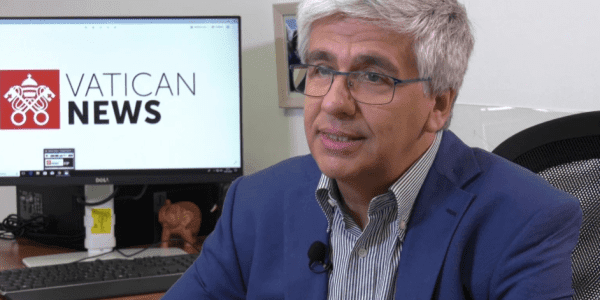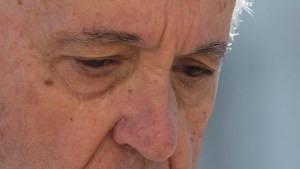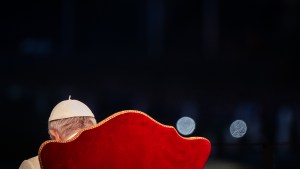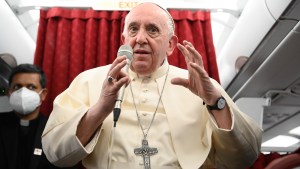Since the beginning of the Russian offensive in Ukraine, on February 24, 2022, the Holy See’s means of communication have been strongly mobilized to make known the distress of the Ukrainian people. The Pope and the Secretariat of State seem to be taking a more general position, in order to maintain contacts with Moscow and to keep the door open to acting as a mediator. The editorial director of the Vatican’s media, Andrea Tornielli, tells I.MEDIA what is at stake in this war in terms of communication.
For more than a month, Vatican News and L’Osservatore Romano have published numerous articles on the war in Ukraine, clearly denouncing Russia’s responsibility, while the Pope has expressed himself in a less frontal way. How are the guidelines for the coverage of this war established at the level of the Dicastery for Communication?
The Vatican media outlets are trying to ensure fact-based communication, and to support the appeals made by the Pope. From the beginning, the aggressor and the victim have never been put on the same level. It’s clear that there has been an aggressor country and a country that was the victim of aggression. And so the fact that Vatican News and L’Osservatore Romano have published headlines about what happened in the war is not at all strange.
Criticism of the Pope for never having mentioned the name of Vladimir Putin is a different conversation. But I would like to recall that during the history of recent decades popes have always avoided mentioning names in their speeches. We can point to the fact that during the events in Kosovo in 1999, John Paul II never named Milosevic in his public appeals. And after the beginning of the NATO bombing, the Pope asked, at Easter 1999, for the opening of humanitarian corridors.
In continuity with his predecessors, Pope Francis speaks on a pastoral level. He’s close to the suffering of the victims, and I would say that his words and appeals seek to uphold what he defined, on the plane returning from Malta, as a “strategy of peace” and not a “strategy of war.” He also seeks to keep a glimmer of hope open to keep the possibility of negotiation with all parties. And so there is nothing surprising here. No one can say that the Pope has not clearly denounced what is happening. If you read his speeches well, he has done so clearly.
Can we say that “getting his hands dirty,” facing the critics and always keeping in touch with the “bad guys,” is part of the mission of a pope, even if it means living a form of “media martyrdom?”
I wouldn’t say it’s a matter of “getting your hands dirty.” Keeping the door open is above all a matter of realism, an evangelical attitude. Political realism means knowing how to get out of this situation, and defining what kind of peaceful future we can build.
This is not just a local or regional conflict between Russia and Ukraine, but a conflict whose escalation could lead to the third world war. Therefore, dialogue remains the most realistic position, not only on a prophetic level but also with a long-term political vision, as the Pope’s action is always oriented.
The Pope isn’t afraid to say things as they are. He has said that war is a “sacrilege” and he has used very strong words. But he’s aware that there are two possible solutions: either a truce and some form of negotiation are reached, or the escalation leads us all to something even more frightening.
The Patriarch of Moscow, who remains an interlocutor for Pope Francis, has delivered very aggressive homilies against the West. How are his words treated by Vatican media?
Clearly, these are homilies that show a total alignment, an identification with the policies of the Kremlin. There is no other way to define them… But we know that there is work going on in the Russian Orthodox Church in Ukraine. For example, there was a petition signed by hundreds of priests and also by some bishops, critical of the positions of the Patriarch of Moscow. So this is a very difficult moment in the Orthodox Church. The Vatican media outlets have published articles on this petition asking the patriarch to change his position.
The Pope’s trips to Iraq and the Central African Republic have shown that he is not afraid of so-called “impossible” trips. There are now huge expectations for a trip by Pope Francis to Kiev. What is the position of the Vatican media on this project? Is the mere fact that this dream is being formulated a sign in itself, or has the Vatican chosen to wait before talking about it for reasons of diplomatic prudence?
The Pope has made it clear that the proposal is “on the table.” If the Vatican media were to talk about a dream, it would give the impression that the dream is a reality. For now, it’s a proposal under consideration. The Pope has said very clearly that he’s willing to do anything “if the conditions are right.” So we must ask ourselves what these “conditions” are.
I don’t believe that the most important issue, from the Pope’s point of view, is that of security. It’s clear that this problem exists, but we’ve seen that the Pope has undertaken very dangerous trips to Iraq and the Central African Republic, against everyone’s advice…
But I believe that the Pope’s concern is above all to know if this trip would make it possible to stop the war, concretely. What are the conditions that would allow such a trip to bring a concrete, stable, effective step towards peace? I believe that this is the fundamental question in relation to this project. In any case, it would be a journey for peace, to show closeness to all, to the Churches, to the population. But before considering these modalities, we must first know if the conditions for a trip are met.
How do the Russian and Ukrainian sections of Vatican Radio work in this context of war?
Since the beginning of the Russian offensive, we have held extended daily meetings, which have involved many more people than usual. We have given voice and space to our colleagues in these small sections, who are in constant contact with their loved ones and with the local churches.
It was very nice to celebrate Ash Wednesday with all the sections: the Mass was concelebrated at the altar by the priest in charge of the Russian section and the priest in charge of the Ukrainian section, who is Greek-Catholic. There was a special prayer. It was a very beautiful moment.
So here, at Palazzo Pio, it is a war that touches us strongly, because we work daily with Ukrainian and Russian colleagues. And then we had envoys to accompany the cardinals who went to meet the Ukrainian refugees.
Has this solidarity between the different sections also allowed Vatican Radio to become a relay of humanitarian support for Ukraine?
Yes, there have been announcements, and we have participated in the collection organized by the Apostolic Chaplaincy. And through the personal connections of some colleagues, we relayed information about the solidary efforts organized in Rome, to understand how we could help.
Has this tragic situation in the heart of Europe led to a rediscovery of the importance of the small language sections of Vatican Radio, after a period of questioning in the context of the reform of Vatican communications?
Vatican media outlets transmit and publish information in 51 different languages. All languages are important; all cultures are important. On an occasion like this, we see even more clearly the value of this multilingualism. As long as it is possible, it will continue, and it is beautiful that it is so.
The Act of Consecration to the Immaculate Heart of Mary was able to be followed in Russia and Ukraine. Every day we ask ourselves how to communicate following the “strategy of peace.” These media outlets represent a bridge and a direct contact with these countries.
But we did not need the war in Ukraine to realize the importance of these sections. It’s a different thing to receive information in a language you understand intimately: in India, for example, English is understood almost everywhere, but Hindi or Malayalam broadcasts bring something else. It allows some listeners to receive news about the Pope and the Holy See in the language of their heart, the language of their birth. It’s different and has a lot of cultural value. So multilingualism remains a central goal for Vatican media.





